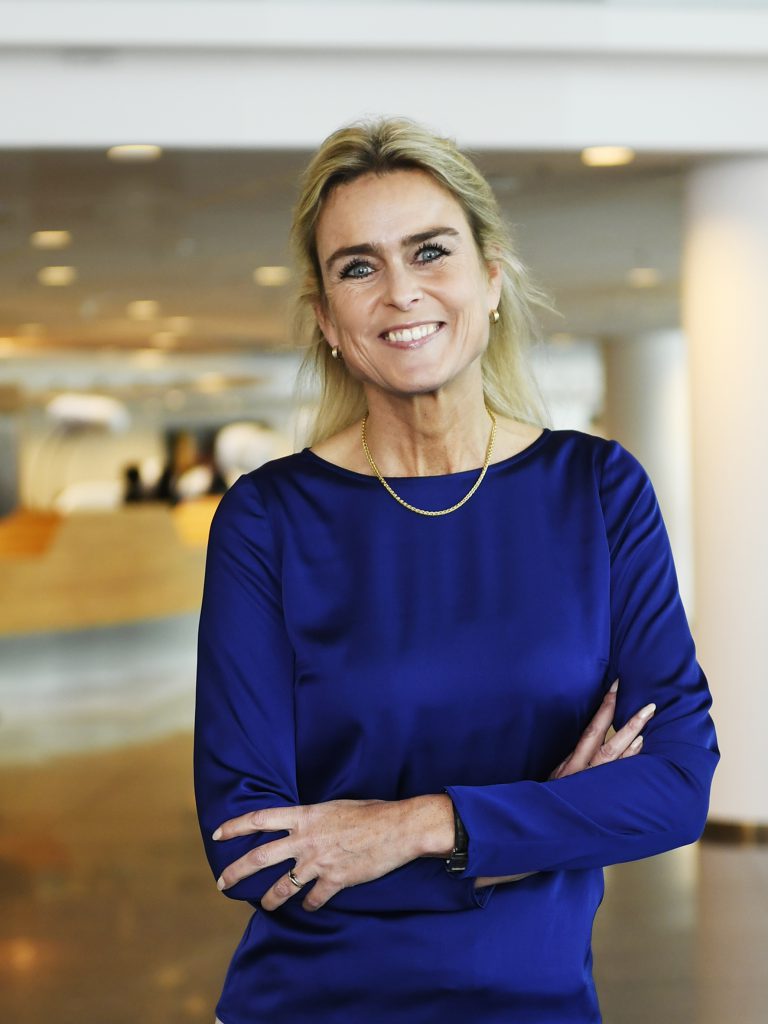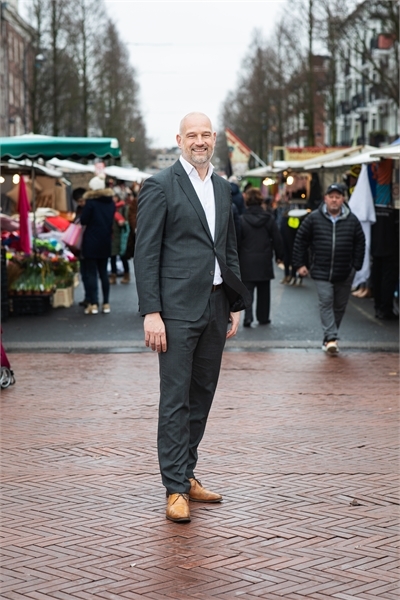Board members in conversation: ‘MBO graduates are the hero of the energy transition’
What does the corona crisis mean for the energy transition in the Amsterdam Metropolitan Area? Board members Barbara Baarsma, Chairman of Rabobank Amsterdam, and Victor Everhardt, Alderman for Economic Affairs in Amsterdam, are hopeful. 'The energy sector could well become the job engine of the region.'
What does the current crisis mean for the energy transition in the Amsterdam Metropolitan Area?
Everhardt: “Today is May 7 and I cannot predict the future, but I am confident that the energy transition will continue. In any case, we as the government will not let go of this agenda. I also see that many organizations continue to run projects. Entrepreneurs are busy with survival and the low oil prices may slow things down a bit, but at the same time entrepreneurs are also constantly looking for opportunities. These lie in the energy sector. In fact, the energy transition could well become an extra job engine, one that is necessary because many other sectors get into trouble. ”
Baarsma: “We see that the low oil price makes projects related to this energy transition less profitable. It would help if the national government sticks to climate policy and thinks about how the CO2 tax can be introduced, for example by lowering other taxes. energy projects profitable again We also see that many consumers have now stopped making their homes more sustainable, that they prefer to put their available money in the savings account. That does not mean that they will no longer do it at all, but they have an extra push necessary to take the right exit during this crisis.As a bank, we can help consumers with sustainability advice when purchasing or renovating a home and with a cheaper mortgage rate for label-A homes. We can also give entrepreneurs such a boost. sustainability and contribute to the energy transition more future-proof and therefore less risky for a bank I would have liked the government to he had drawn up criteria with the banks for the provision of guarantees for bridging loans. ”
Everhardt: “I understand that well. The government’s initial response was good. The government has launched a financial bazooka to keep employers and employees close to each other and to prevent the mistakes made in the previous crisis. Now we have to follow up. of this support and work together towards The Hague. So that everyone can take their responsibility to support companies. We must also recognize that we cannot prevent all bankruptcies. “
Baarsma : “That is why it is important that we are talking. Together we can paint a good picture of the sectors that are struggling and make the best possible use of the resources available. The Greater Amsterdam region is hit harder by the crisis than the rest of the Netherlands. If only because of the sector structure with a lot of catering, but also because we have a wonderful ecosystem here of small, medium and large companies in both business and creative sectors, which mutually reinforce each other. We call this agglomeration effects. The little ones are the lice in the back of big companies and creative and IT companies are driving productivity increases. If companies fail, that is a great risk for the city because of the disappearance of agglomeration effects. “
“We have to maintain the networks, investigate what the really vital sectors are for the future. Energy is certainly one of them. ”
Everhardt : “I fully agree with that. As a government, we must listen carefully and we are already doing that. We must maintain the networks, investigate what the really vital sectors are for the future. Energy is certainly one of them. . “
Baarsma : “As a city, we will soon have specific surplus and deficit sectors. With TechConnect we focus on shortages in the tech sector. Maybe we should set up something similar for the energy sector. We need a lot of hands to make our electricity grid more powerful and to be able to realize the energy transition, or more precisely: electrification. The transition is now stalling because there is a shortage of people like that. We need an EnergyConnect. “
Everhardt : “Certainly! This is the famous opportunity to take a step forward. We have all kinds of instruments in our hands, for example our cooperation at MRA level, including with the UWV.”
Baarsma : “Alliander and other parties in the energy sector are the natural allies here. Naturally, these are electricity producers, but also branch organizations of sectors where surpluses are created by this crisis. We are also happy to be of assistance.
Everhardt , laughing: “This is going to happen. We need so many people for that energy transition. Not only engineers, but also builders and other technical personnel.”
Baarsma : “You are absolutely right, Victor. There is a lot of work involved. Laying pipes. Building. The MBO student is the hero of the energy transition.”
Barbara Baarsma, Chairman of the Board of Rabobank Amsterdam
Both the municipality and Rabobank are already investing heavily in the energy transition. For example, the municipality is investigating the establishment of the Invest-MRA fund. Rabobank stimulates the sustainability of homes, including Greenhome and green mortgages.
Baarsma: “Globally, Rabobank is in the top ten financiers of renewable energy and in the Netherlands, too, the bank is one of the largest financiers, for example of wind turbines. As a farmers bank, we started earlier and on a larger scale with building the first wind turbines In addition to bank capital, Invest-MRA can be additional by making venture capital available to start-ups and scale-ups in the energy transition, which are needed as the thorn in the fur of large companies to advance the sector as a whole. At Rabobank, we have a team of sustainability bankers specifically for the MRA and of bankers who focus on start-ups and scale-ups. They also focus on parties that contribute to the energy transition. ”
Everhardt: “That is very welcome, because we must continue to invest in this sector – even though we are now contending with a number of drawbacks in our budget. We are also discussing this with The Hague. Invest-NL will offer opportunities for our region and the question is how we as a region can and will make optimal use of this. ”
Mr. Everhardt, your colleague Marieke van Doornick announced at the beginning of April that Kate Raworth’s donut model will play an important role in the city’s circular ambitions. What does that model mean for the energy transition?
Everhardt: “A lot. The donut model is a good concept that gives us direction and shows that we want to represent a certain kind of economy. That we are concerned with the climate issue and take into account the limits of what our planet can handle. It is important for entrepreneurs to have space. I see a lot of opportunities and growth for entrepreneurs to invest in the energy transition. “
“Collaboration between cities and their surroundings is also important. Amsterdam desperately needs the space of the surrounding area to achieve its energy objectives, for example to be able to construct wind farms.”
Baarsma: “I think the economic substantiation of the donut model is a bit meager, but I certainly think that it contains interesting elements, also for the MRA. Take inclusivity. The energy transition costs money, also from citizens. It is therefore important that we pay attention to the affordability of the transition Collaboration between cities and their environs is also important, as Amsterdam desperately needs the space to achieve its energy objectives, for example to be able to construct wind farms. From an agricultural point of view, this area is also interesting for the city. may have the most varied agricultural environment in the world, yet our meals have traveled an average of 30,000 kilometers.As a bank, we strive for shorter food chains, also because they enable circular agriculture, which in turn helps with the energy transition. and the farmers there pay a reasonable price, then they can invest that money in smarter log logistic solutions and more sustainable production. This short food chain can thus contribute to the energy transition. We see that the current crisis, where people sometimes miss out on the shelves, is increasing awareness about where our food comes from. For example, we also invest in Support Your Locals NL, a national campaign behind which a lot of Amsterdam entrepreneurship is behind. ”
Everhardt: “The challenge of the energy transition is so great that if we look for solutions, we can never solve them alone within our municipal boundary. We need each other within the MRA. I also have a lot of faith in the short chains you call Barbara. I hope that we will be able to hold on to that good story about this even after the crisis. Or will we then choose cheaper products from further afield? “
Baarsma : “The government can play an important role in this. The CO2 tax has been temporarily postponed, but I actually think that we should not wait with this. I do not want to increase the tax burden, so we should mainly shift. With this tax we can prevent relapse to old behavior. ”
Everhardt : “I think so too. We must use the instruments that we as government have for this purpose.”
Victor Everhardt, Alderman for Economic Affairs, Municipality of Amsterdam
What are your personal considerations for working on the energy transition? Why do you think it is so important?
Everhardt: “It is necessary. I entered the world of political administration to be able to make a serious contribution to these kinds of complex issues. It requires patience, also from politicians, because the results of what you do in this complex changes are ultimately only visible in the long term. ”
Baarsma: “I think that as an economist I can add something to the policy. And I also have a personal reason: I love life. I also wish others after me a good life. That is why we have to allocated environmental utilization space. I want to continue to work towards that. ”
Text: Mirjam Streefkerk
Board members in conversation
Go in 2020 board members talking to each other about the energy transition. What is their vision for taking steps faster and how are they working on it? This is part two of the series.
Board member Barbara Baarsma will also participate in MRA University’s online webinar on June 9.
MRA University: Barbara Baarsma about shortening (food) chains
Part 3: Dominique Hermans (Managing Director Randstad Netherlands) and Hans Snijders (Chairman of the Executive Board of Nova College) discuss the energy transition & the impact of the coronacrisis
What the Board is doing within the energy transition
With our initiative LEAP we are at the beginning of impactful changes in the data center chain. Would you like to join the LEAP coalition and participate in a pilot, please contact: Marjolein Bot .
In the context of the corona crisis, the Board is working on economic recovery with respect for the climate challenge. read here how we do that.
read more about our metropolitan challenge Energy.
Would you like to receive our most important news in your mailbox from now on? Then sign up here for our monthly Board Update.
11 september 2020
Meer weten over
Neem contact op
Blijf jij ook op de hoogte?
8x per jaar nieuws en events uit de regio: schrijf je in voor de Board Update nieuwsbrief
Deel dit artikel
Wil je op de hoogte blijven?
Volg ons dagelijks op LinkedIn en schrijf je in voor de Board Update nieuwsbrief.
Lees ook deze berichten
- Incision Assist won 20 januari de regionale voorronde voor de Nationale Zorginnovatieprijs 2026. Hoe ...
- “We hebben een nieuw besef nodig over de wereld waarin we opereren. ...
- Eind januari presenteerden D66, VVD en CDA het nieuwe coalitieakkoord, met de ...



